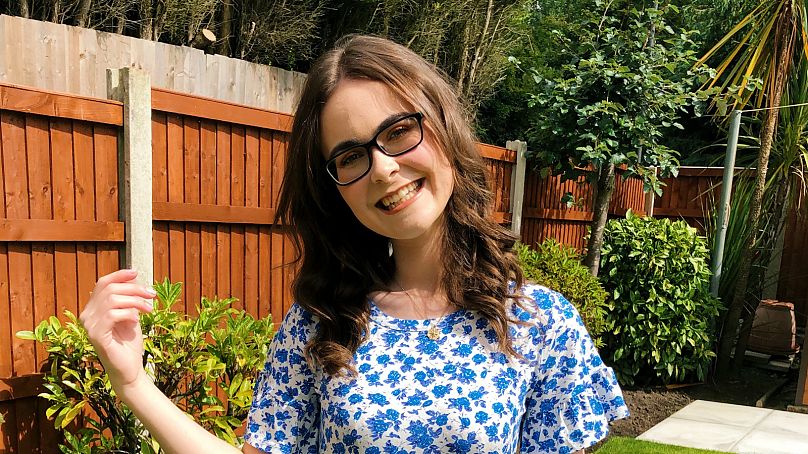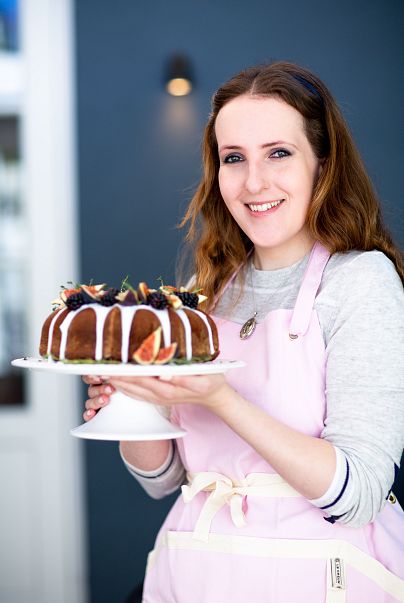Young women have experienced the highest levels of anxiety and depression, while single men have struggled with loneliness.
Since Emily Bashforth was 13 years old, she has battled an eating disorder that, at its worst, resulted in her not eating or drinking anything for days on end.
Now 21, regular hospital appointments had helped Bashforth bring her disorder under control. But when the coronavirus lockdown began, face-to-face sessions were replaced by phone calls.
"I had a week during lockdown where I stayed in bed most of the time and didn’t want to be seen by anyone," she told Euronews.
"It came after I had to weigh myself at home for my specialist to monitor me, and my weight had dropped quite a bit, something I couldn’t afford to happen.
"It made me feel so despondent and stuck, and imagining a life without an eating disorder just didn’t seem possible."
Across Europe and the world, experts say that the COVID-19 lockdowns have had a massive impact on mental health. With many countries warning of a second wave, that effect isn't to subside soon.
In the UK, mental health charity Mind said the country's "overall" emotional well being had deteriorated during the pandemic as it warned against "an even bigger crisis" further down the line.
"We're missing an ingredient that makes us human," psychotherapist Aaron Balick told Euronews, in reference to the effect on diminished social interaction.
"Meetings over Zoom don’t quite come close to what we need. We basically need complex interpersonal situations, ie: real-life interactions with people."
READ MORE | Will COVID-19 change the way we travel forever?
Balick stressed that we shouldn't underestimate the importance of all types of communication, which include being able to read body language in a face-to-face interaction.
He added: "Most of us have lost a big proportion of that [...] even when we go out and it's socially distant, it's still brief."
According to Mind, which surveyed 16,000 people, 65% of adults who had pre-existing mental health issues reported a worsening effect during lockdown, while three-quarters of 13-24-year-olds reported the same.
'Setbacks'
Bashforth said she has been "massively" affected by lockdown and experienced "setbacks" in her illness.
"I became obsessive with the idea of gaining weight whilst quarantining, causing familiar yet unwelcome eating disorder thoughts to resurface," she said.
This wasn't helped, she said, by seeing people panic buying food in the supermarkets, and when the government launched a weight loss and exercising campaign.
But she added that she was "just grateful to be alive when so many people had lost their lives to the virus.
"Lockdown, despite all the struggles, definitely gave me a new appreciation for life and coming out of it just makes me want to get back on track with my recovery, because if the last few months have shown us anything, it’s that life is too short, and I don’t want to waste mine with this eating disorder anymore."
READ MORE | Final curtain? How coronavirus might have killed off London's West End
Young women have been found to have experienced the highest levels of anxiety and depression during lockdown in a study from the Centre for Longitudinal Studies, while researchers with Relate discovered single men were hardest hit by loneliness.
Bipolar UK, a charity supporting people with bipolar disorder, said nearly a third of its community had reported an increase in suicidal thoughts since the lockdown had come into effect.
"The uncertainty, unpredictability and uncontrollability created by the pandemic has resulted in an existential crisis for many people," psychotherapist Eva Koumpli told Euronews.
"The pandemic has caused many to question their meaning or the meaning of life in general."
This, she said, has led to more people experiencing higher levels of anxiety, stress or depression.
'I think about killing myself a lot'
British comedian Joe Tracini has borderline personality disorder (BPD), and has been documenting his consistent thoughts about taking his own life — particularly during the pandemic.
"One of the symptoms of [BPD] in me is that I think about killing myself a lot," Tracini explained to his nearly 200,000 Twitter followers.
"I don't pick that, obviously, who would? But my brain tells me to kill myself because I've run out of melon, and so I'm kind of used to that.
"But the longer this stuff goes on, the harder it is not to kill myself."
Tracini, who is best known for his acting role in British soap opera Hollyoaks, said there had been some days "exclusively" spent with him trying to not take his life.
Describing an incident at a supermarket in June, he said: "I don't like queuing to buy bread.
"It's not on my list of comfortable things to do.
"Last week, I went to a different shop for the first time that sold different things.
"That small amount of change on that day made me think I needed to kill myself.
"This wasn't my normal day-to-day living with suicidal thoughts. This was an instruction. It has happened before."
The 32-year-old then explained he would think about ways to go through with suicide, and eventually had to wait six or seven hours for the thoughts to retreat.
He added: "I sort of ended up feeling like a drawing in a colouring book and I hadn't been given any crayons."
And Tracini isn't alone in his thoughts. A simple search through social media uncovers numerous people who have reported struggling with suicidal ideation in lockdown — some of whom also said they had undergone failed attempts.
Suicidal and catastrophic thoughts are one of the hallmarks of anxiety and depression, said Balick, adding that people should also look out for feeling consistently bad, having difficulty getting out of bed and withdrawing from the world.
READ MORE | Are face masks tearing us apart?
Other signs, he said, are more subtle in their manifestations such as changes in routine, diet and drinking, social withdrawal, self-sabotaging behaviours and self harm.
He said: "Try not to be frightened and reach out for help as soon as you become aware there is a struggle.
"Try charities with a helpline, or your GP could put you in touch with a counsellor. You could also talk about it with friends.
"Definitely do not sit on it. That’s the most important thing."
The importance of routine and structure
Scottish comedian Ashley Storrie was unable to work during lockdown as the comedy circuit was closed for social distancing purposes.
The 33-year-old, who takes medication for anxiety and has autism, told Euronews her lockdown experience was "horrendous", but that it was her creation of a new routine that helped her through the terror.
"Making money became my prime objective to supplement my income," she said, adding: "I have been livestreaming some form of entertainment to give me more of a routine schedule than before.
"It gives me a feeling of regulation because I have to wash my face, clean my hair — all the things that I'd had to do if I was doing a stand-up gig."
This sense of structure is "so important," Balick said. "Particularly when you're living with mental health problems.
"You invest a lot of psychological energy in those systems — and some of those systems were those jobs.
"There's no structure and no potential of income, and that's anxiety provoking."
'I was terrified I would never see my family or friends again'
For Sisley White, a food blogger from London, a deep fear emerged of potentially infecting others, and never being able to see her loved ones again.
She told Euronews: "I was so worried that if I didn’t do the right thing when going outside that I would risk others being ill.
"I was terrified that when lockdown ended I would no longer have members of my family or friends.
"The fear of the death number on the news made me scared I would never seen people again."
READ MORE | How the coronavirus pandemic is changing the way Britain builds
Having experienced mental health issues all her life — which resulted in her having to take a year off from school as a child — White said her career as a blogger and writer meant she could work from home most of the time, where she is more comfortable.
"I work from home as a food blogger and writer as going to work was too hard with my mental health," she said.
"So as much as it stops me doing some things, it’s opened up beautiful new routes of my life which I love. I’ve been lucky enough to shape my anxiety and not let it stop me from achieving."
White may be more accustomed to remote working than others, but she said the additional isolation with lockdown and change in atmosphere on the streets had promoted a sense of loneliness — especially when she had been working longer hours as a distraction.
She described several "emotional moments" where she had to take self care days and early nights to put her well being first.
"This loneliness hit once I had to stop working seven days a week as it was making me exhausted. Pretending the global pandemic wasn’t happening had to break eventually."
She added: "Having anxiety before lockdown was my brain telling me that the worst was going to happen; when lockdown started my anxiety had a hard time trying to have that hold on me as something bigger than my anxiety was happening."
In an email, Koumpli stressed the important distinction between maintaining a physical distance to keep COVID-19 under control, and that of being socially distant.
She said: "Connection, relationships and caring for our emotional and mental health do not have to be cancelled.
"I would like to encourage people to reach out to their support networks. A lot of private mental health services and individual therapists provide online therapy for free or at reduced rates during the pandemic.
"Also, there are a lot of online resources and websites that offer blog posts, psycho-education and advice."
'We're living in a transitional state'
According to Balick, living in a constant state of transition due to ever changing rules and restrictions is something we may need to get used to.
He said: "In general, as a society, we have to learn to live with uncertainty better […] and we might need help to do that.
A government strategy that also places focus on looking after our mental well being could help with this, he said, and also making use of any resources available.
"We need to have a more flexible approach to a novel situation," he said, adding: "Try not to seek certainty of when this is going to be over. We may need to try and be comfortable not knowing what's going to happen."
If you struggle with any of the issues raised in this article, you can find a list of helplines in Europe by clicking here.














